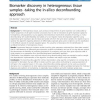Free Online Productivity Tools
i2Speak
i2Symbol
i2OCR
iTex2Img
iWeb2Print
iWeb2Shot
i2Type
iPdf2Split
iPdf2Merge
i2Bopomofo
i2Arabic
i2Style
i2Image
i2PDF
iLatex2Rtf
Sci2ools
117
click to vote
BMCBI
2010
2010
Biomarker discovery in heterogeneous tissue samples -taking the in-silico deconfounding approach
Background: For heterogeneous tissues, such as blood, measurements of gene expression are confounded by relative proportions of cell types involved. Conclusions have to rely on estimation of gene expression signals for homogeneous cell populations, e.g. by applying micro-dissection, fluorescence activated cell sorting, or in-silico deconfounding. We studied feasibility and validity of a non-negative matrix decomposition algorithm using experimental gene expression data for blood and sorted cells from the same donor samples. Our objective was to optimize the algorithm regarding detection of differentially expressed genes and to enable its use for classification in the difficult scenario of reversely regulated genes. This would be of importance for the identification of candidate biomarkers in heterogeneous tissues. Results: Experimental data and simulation studies involving noise parameters estimated from these data revealed that for valid detection of differential gene expression, qua...
| Added | 08 Dec 2010 |
| Updated | 08 Dec 2010 |
| Type | Journal |
| Year | 2010 |
| Where | BMCBI |
| Authors | Dirk Repsilber, Sabine Kern, Anna Telaar, Gerhard Walzl, Gillian F. Black, Joachim Selbig, Shreemanta K. Parida, Stefan H. E. Kaufmann, Marc Jacobsen |
Comments (0)

